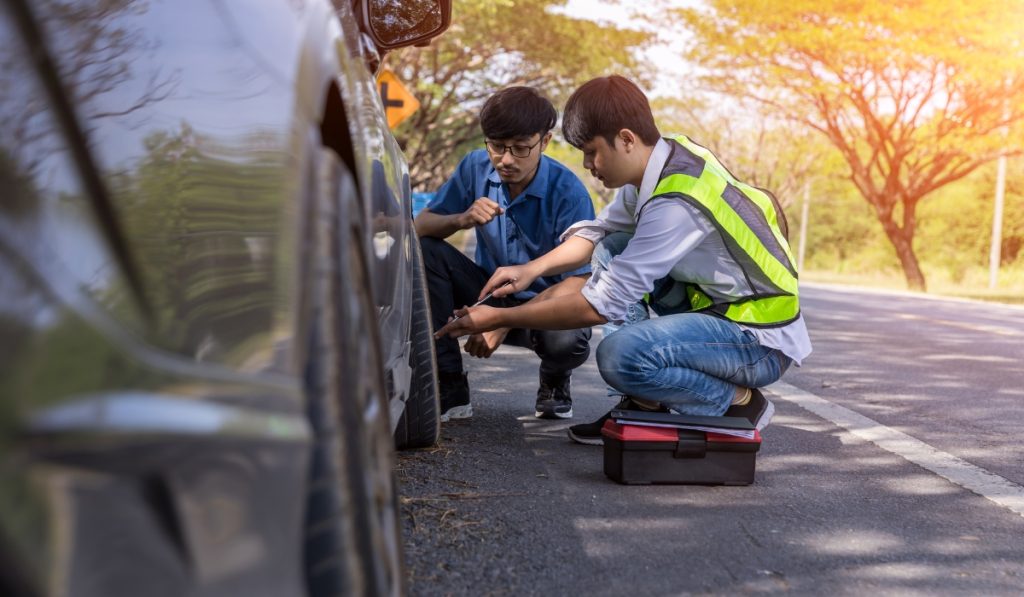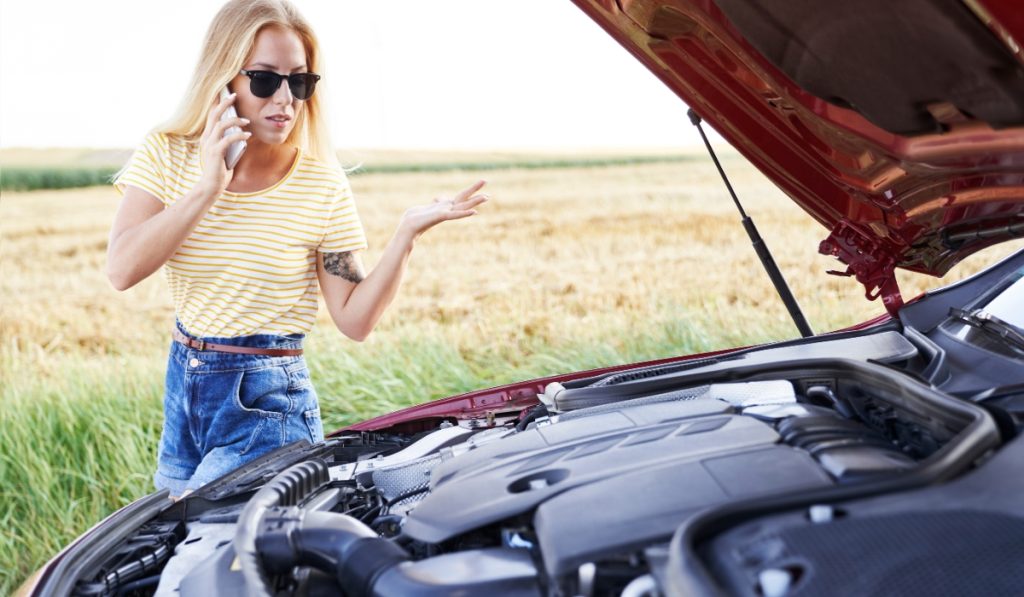Knowing what to do when your car breaks down is key to staying calm and safe during an unexpected vehicle breakdown. Dedicated Towing and Recovery offers essential tips to guide you through common breakdown issues and prevent further damage.
Ensuring Your Safety First
If your car breaks down, your safety comes first. Turn on your hazard lights right away. This lets other drivers know you have a problem. If you have emergency flares or reflective triangles, put them behind your car. This makes you easier to see.
Next, find a safe spot to stop. Try to pull over on the shoulder or an emergency lane. Stay away from places where drivers can’t see you well, like near curves or hills. When you stop, stay inside your car if it’s safe. This keeps you protected from traffic and bad weather.
If it’s not safe to stay inside, get out carefully on the side away from traffic. Wait at a safe place until help arrives.
Activating Hazard Lights and Signaling for Help
Hazard lights are very important when your car breaks down. Turn them on as soon as you notice trouble.
- Place emergency flares or reflective warning triangles if you can.
- Use your phone to call for help.
- Tell roadside assistance exactly where you are and what’s wrong.
These steps help other drivers slow down and keep distance while someone comes to help.
Safely Pulling Over to the Side of the Road
Picking a good spot to stop can keep you safe during a breakdown:
- Look for flat ground with plenty of space between lanes.
- Don’t stop near intersections, bridges, tunnels, or sharp turns.
- If possible, park behind guardrails or barriers that protect you from traffic.
Once you’ve parked safely:
- Lock your doors unless you need to get out.
- Keep your hazard lights blinking so others see you.
Doing this helps keep both you and other drivers safe on the road.
Assessing the Situation
After staying safe, try to figure out what caused the breakdown before calling for a tow:
- Check simple things first: Is there gas in the tank? Are battery cables loose? Sometimes tightening cables fixes the problem.
- Listen for odd sounds: Clicking noises can mean battery trouble; grinding sounds might point to transmission issues.
- Look at dashboard lights: Warnings like “Check Engine” give clues about engine problems. If overheating signs show up, stop driving right away.
- Try restarting carefully: If the car won’t start after waiting a few minutes, don’t keep trying—this might drain your battery more.
Knowing these signs helps you tell tow operators what they need before they arrive.
Contacting Roadside Assistance

If your car breaks down, call for reliable roadside assistance right away. Use the emergency phone number from a roadside assistance provider you trust. Pick a service that gives reliable service and answers fast. Calling for roadside help fast can make things less stressful and get you moving again.
Keep your phone close. Dial the emergency contact number from your roadside assistance plan or insurance card. If you don’t have one, search for local towing services that work all day and night. Stay calm so you can talk clearly to the person on the phone.
Here’s a quick checklist to remember:
- Have your phone ready
- Know the emergency phone number
- Choose a reliable service
- Call for help as soon as possible
Communicating with Roadside Assistance
Giving clear info helps them come faster. When you call, have these three things ready:
Providing Your Location
Tell them exactly where your car is stopped. Use street names, mile markers, nearby buildings, or GPS if you can. A clear vehicle location helps them find you quicker.
Describing the Problem
Say what’s wrong in simple words. Is it a flat tire? Engine trouble? This helps the technician bring the right tools for car trouble solutions or car malfunction troubleshooting.
Vehicle Information (Make, Model, Year, License Plate)
Give details about your car like its make (brand), model, year made, and license plate number. This vehicle identification makes sure they handle your car right when they tow or fix it.
Having this info ready makes calling roadside assistance easier and faster. It helps everyone stay safe while you wait.
Keeping Your Car in Top Condition
Doing regular vehicle maintenance stops most breakdowns before they start. Cars often break down because of stuff like dead batteries, flat tires, or engine troubles. You should check your car’s fluids, brakes, and tires pretty often. Vehicle diagnostics tools can find problems before they get worse.
If your car shows warning lights or makes weird noises, don’t just ignore them. You can do some simple car malfunction troubleshooting yourself, like checking tire pressure or oil levels. That saves you a lot of time and money. Following good vehicle safety measures helps your car work better and lowers chances of getting stuck on the road.
Building Your Emergency Kit
It’s smart to keep an essential emergency roadside kit in your car in case you break down. Here’s what you should have:
- Flashlight with extra batteries
- Reflective vest so drivers can see you
- Emergency flare or other hazard signaling gear
- Basic tools like a screwdriver and pliers
- Jumper cables
- First aid supplies
Make sure you have emergency contact numbers saved on your phone or written down somewhere. These things keep you safer while waiting for help and help alert other drivers if needed.
Planning Your Route
Planning your trip can help you avoid places where cars break down a lot. Try not to drive where there are roadside hazards like bad lighting, narrow shoulders, or heavy traffic jams. Look up traffic safety updates before you hit the road so you can steer clear of risky spots.
Keep traffic hazard safety tips in mind too—like keeping plenty of space between vehicles—to lower chances of trouble while driving. When possible, pick roads that get good care and offer quick access to help like towing services.
Dedicated Towing and Recovery: Your Reliable Partner

When your car breaks down, you need someone dependable. Dedicated Towing and Recovery shows up fast with professional help. We keep you safe and calm in tough roadside moments. You can count on us for prompt assistance anytime. We’re that friendly face who cares about your situation.
We offer 24/7 support for emergency roadside help. Day or night, our team stays ready to fix problems fast. Here’s what we provide:
- Emergency roadside service whenever you need it
- Skilled technicians who know their job well
- 24/7 towing services without delay
- Quick responses that reduce your wait time
- A trusted roadside assistance provider at your call
No matter when trouble hits, expert help comes quickly. You won’t be left waiting long with us around.
Our Commitment to Safety, Efficiency, and Compassion
Safety leads every step we take. We tow cars only from safe locations using advanced gear. Our skilled technicians work hard to protect drivers, passengers, and others on the road. We aim to:
- Minimize disruption near the breakdown spot
- Keep traffic hazards low for everyone’s safety
- Provide clear instructions to ease stress
- Offer a calm, helpful, friendly face in tough times
We get that car trouble is scary. So, we act with care and patience. Our team brings compassionate service while staying quick and reliable.
Transparent Pricing
We keep pricing simple and clear—no hidden fees here. Before we start towing, we tell you exactly what the charges will be. That way, you can:
- Know costs upfront without surprises
- Trust fair towing charges that match our service
- Avoid confusing bills later on
This honesty helps build trust between us and our customers.
If your car breaks down suddenly, call Dedicated Towing and Recovery. Our team works 24/7 to give dependable help fast. We offer professional service with a friendly face in tough times. We mix care with skill to bring reliable roadside assistance whenever you need it.
Don’t wait—call us now for quick help from techs who focus on safety and honesty every time. We want to help you get back on the road fast and feeling sure!
